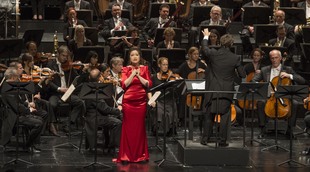 © Marco Borrelli
© Marco Borrelli
Verdi’s I due Foscari is a definite contender for the title of “least dramatic opera”. Not much happens: the younger Foscari (Jacopo) is sent back into exile by the Venetian Council of Ten and dies on the way. His wife Lucrezia pleads and suffers, in vain. Led by the Foscaris’ enemy, Jacopo Loredano, the Council also votes to remove the older Foscari (Francesco) from his position as Doge. This double grief kills him.
Despite his role as the antagonist, Loredano has little to do (no arias, just recitative and bits in ensembles). As a result, there is no direct conflict. The opera devotes its time to the trio of family members, all perpetually in anguish. Even Verdi’s use of symphonic motifs for the characters’ entrances emphasizes this lack of change. The motifs are always the same, and so are the people and their situations.
At the Salzburg Festival, I due Foscari was presented in a concert format, further reducing its theatricality. Sometimes “concert” means “semi-staged” these days, but this was strictly a stand-behind-music-stands-and-sing affair, with the singers barely even looking at each other as they conversed. It was all about the music, which was delivered brilliantly by the Salzburg Mozarteum Orchestra but less successfully by the singers.
Plácido Domingo has been singing Francesco Foscari across Europe in the past few years, as part of his transition into baritone repertoire. Dramatically, the role is a fit. Domingo looks the part of an aging patrician, and he conveys the noble despair of his Cornelian dilemma well. But while his voice retains its artistry and expression, it has developed a pronounced wobble. At times he catches and holds a note that soars, but in the faster sections he hides tonal inaccuracies in exaggerated vibrato.

I Due Foscari (2017), Guanqun Yu, Michele Mariotti
Soprano Guanqun Yu is also a bad fit for the part of Lucrezia Contarini. Her cold, almost shrill voice is flexible and has moments of surprising power, but overall it is not large enough for this repertoire. It rarely carries commandingly above the orchestra; airy top notes fail to bloom. Among the trio of leads, the only perfect casting is Joseph Calleja’s Jacopo Foscari. He creates a bright, forward sound that is consistent throughout his range. His top B-flats seem to be a stretch, but that just adds a thrill of uncertainty. (He always gets there, even if he is cherry-red by the end of the aria.) He also takes the prize for clear Italian diction.
The other star of the concert was the Salzburg Mozarteum Orchestra, conducted by Michele Mariotti. They got off to a thunderous start with the overture, and the drums and cymbals (called on plenty in this score) showed smashing energy throughout. The highlights, however, were the softer moments: satiny clarinet solos in acts one and three and the eerie violin and cello duet leading into the tenor’s mad scene. The strings deserve special commendation for repeating the characters’ motifs and bringing new excitement to them each time. The orchestra’s only fault was overwhelming the Vienna Philharmonia Choir, but that was likely unavoidable given their relative placement on the Festspielhaus stage. (The choir was at the very back, which gave them a vague, blended sound that didn’t carry well.)
Perhaps because of its dramatic shortcomings, I due Foscari is not a repertoire staple. This concert offers a chance to catch a rarity, played very well. Just don’t expect great singing or great emotional impact.
the 15 of August, 2017 | Print
Comments